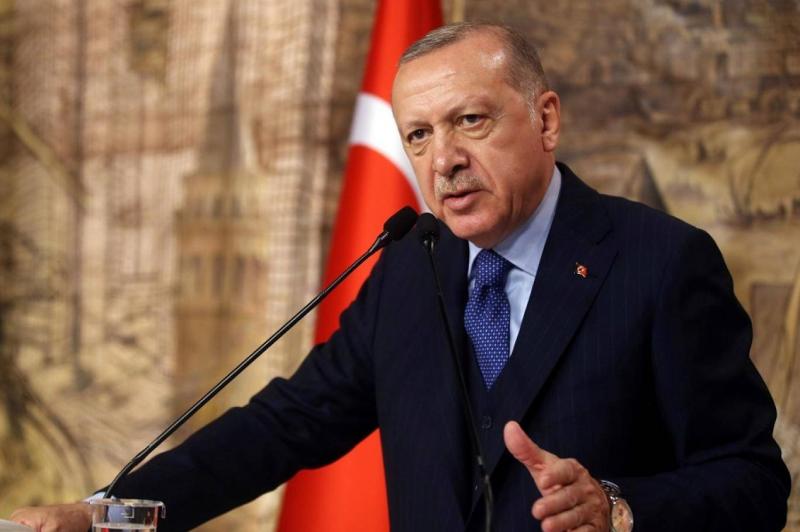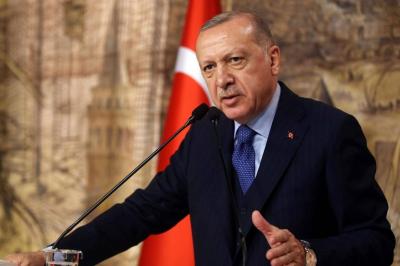Turkish President Recep Tayyip Erdoğan defied expectations that the elections would end his political journey, rallying a mix of religious voters and supporters of the nationalist camp who can now seemingly keep him in power for a third term. Although Erdoğan has not secured victory yet, as he must win in the runoff on May 28 against his rival Kemal Kılıçdaroğlu, support for him has increased after his strong performance in the first round of voting on May 14. Analysts are confidently predicting his victory.
Winning the elections would solidify his rule, which has altered Turkey's political landscape and reshaped the secular state established 100 years ago to fit his religious vision, while tightening his grip on power in what opponents consider a shift toward authoritarianism. Globally, Erdoğan has redirected Turkey's NATO member status away from traditional Western allies, establishing ties with Russian President Vladimir Putin and positioning Turkey as a significant regional power.
Critics say he has intensified polarization during his 20-year rule, including during the current campaign. He denied this before the elections and accused his opponents of "poisoning political discourse." In an interview with CNN Türk last Thursday, he stated, "We will continue embracing our nation, a mindset stemming from our culture... If we win, everyone among our 85 million people will win."
The voting is seen as the most crucial since the establishment of modern Turkey a century ago, as the opposition sensed its best chance so far to overthrow Erdoğan and undo much of the deep changes he implemented in Turkey. However, the elections reaffirmed his position, revealing miscalculations by his opponents who anticipated that he would be hurt by the cost of living crisis and criticism of the government’s handling of the February earthquakes, which killed over 50,000 people.
Critics and earthquake survivors expressed anger over the slow initial government response to the quake and lax enforcement of building codes, failures that resulted in loss of life. Nevertheless, Erdoğan's Justice and Development Party (AKP) ranked first in ten of the eleven provinces affected by the earthquake, aiding him in securing a parliamentary majority with his allies in the parliamentary elections held on May 14.
The campaign is becoming increasingly competitive as Erdoğan seeks to rally his conservative base and describes his opponents as "LGBTQ supporters." In an attempt to capitalize on deep-seated nationalism in Turkey, Erdoğan also exploited support for Kılıçdaroğlu among Kurds, accusing his rival of siding with terrorism and having ties to the Kurdistan Workers' Party (PKK), allegations Kılıçdaroğlu dismissed as mere slander.
Nicholas Danforth, a specialist in Turkish history and a non-resident fellow at the Eliamep Research Center, remarked, "Erdoğan has blended religious sentiment with national pride and demonstrated to voters that he fiercely opposes elitism on both local and international levels." He added, "People know who he is and what his vision for the country is, and it seems that many agree with it."
He noted, "However, just because the winds are blowing in favorable directions doesn't mean the sailing will be smooth. The economy will continue to deteriorate, the opposition will not go away, and many world leaders no longer like or trust him more than they did yesterday." Opponents argue that his continued rule for another five years risks inflicting further damage on democracy, which they see as having been undermined by the concentration of power in the executive presidency, silencing of dissent, imprisonment of critics and opponents, and control over media, judiciary, and economy.
Erdoğan presents himself as the protector of Turkish democracy, having rejected military intervention in Turkish politics. He survived an attempted coup in 2016 when rogue soldiers attacked the parliament, resulting in the death of 250 people. With the substantial support of pro-Erdoğan media, his electoral campaign focused on his economic successes rather than the cost of living crisis. Erdoğan filled the pre-election period with celebrations of industrial achievements, including the launch of Turkey’s first electric car and the inauguration of the first amphibious assault ship, built in Istanbul to carry Turkish-made drones.
He also accelerated the delivery of the first shipment of natural gas to a marine station from a reserve discovered in the Black Sea and promised free natural gas for households, while inaugurating Turkey's first nuclear power plant in an online event attended by Russian President Vladimir Putin.
**Economic Aspect**
The economy was one of Erdoğan's main strength points in the first decade of his rule, as Turkey enjoyed long-term prosperity with the construction of new roads, hospitals, and schools and rising living standards for its 85 million residents. However, the economy has become a political issue as the government adopted a policy of lowering interest rates to combat rising inflation. This policy aimed at fostering growth led to a currency collapse in late 2021 and worsening inflation.
**Mayor of Istanbul**
Erdoğan grew up in a poor neighborhood in Istanbul and attended an Islamic vocational school. He began his political career as a youth leader in a local party and served as the Mayor of Istanbul in 1994. He spent time in prison in 1999 for a poem he recited in 1997, comparing mosques to barracks, minarets to trenches, and believers to soldiers. After becoming the leader of the AKP, he became prime minister in 2003. His government successfully restrained the Turkish military, which had overthrown four governments since 1960. In 2005, he began negotiations to achieve a long-held ambition of joining the European Union—an effort that later stalled significantly.
Western allies initially viewed Erdoğan's Turkey as a vibrant mixture of Islam and democracy that could serve as a model for Middle Eastern countries struggling to break free from autocracy and stagnation. However, his efforts to impose greater control led to polarization within the country and raised concerns among international partners. Enthusiastic supporters viewed this merely as a reward for a leader who returned Islamic teachings to the heart of public life in Turkey and advocated for the devout working classes. In contrast, opponents saw it as a deepening of authoritarianism.
After the coup attempt in 2016, authorities launched a widespread crackdown, detaining over 77,000 awaiting trial and dismissing or suspending 150,000 civil servants. Human rights organizations report that Turkey became one of the world's largest imprisoners of journalists for some time. The Erdoğan government claimed the crackdown was a response to threats from coup supporters as well as the Islamic State and the PKK. Domestically, the sprawling new presidential palace on the outskirts of Ankara stands as a landmark of Erdoğan's new powers, while externally, Turkey is increasingly showcasing its capabilities, intervening in Syria, Iraq, and Libya, and frequently deploying Turkish-made military drones with decisive force.




